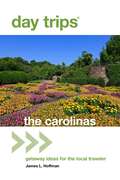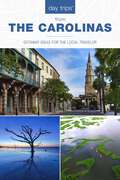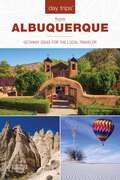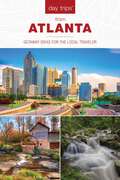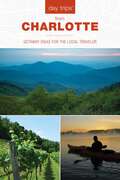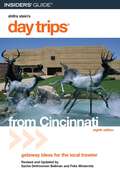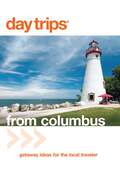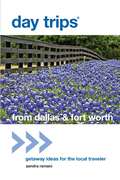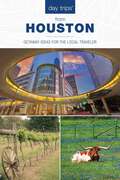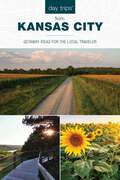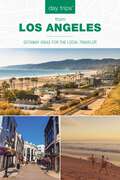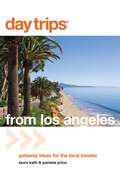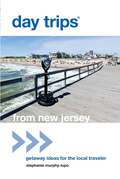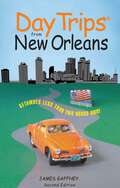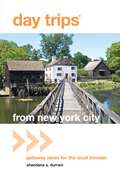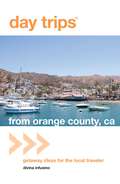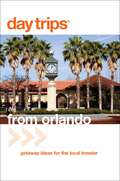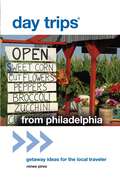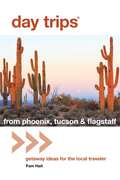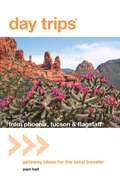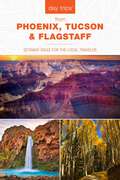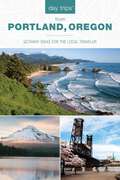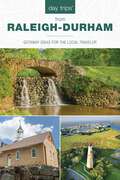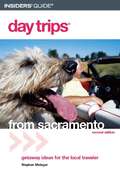- Table View
- List View
Day Trips® The Carolinas: Getaway Ideas For The Local Traveler (Day Trips Series)
by James L. HoffmanGetaway Ideas for the Local Traveler Rediscover the simple pleasures of a day trip with this fun and friendly guide. For local travelers seeking new adventures in their own backyards as well as for vacationers looking to experience all the excitement the area has to offer, each Day Trips® guide offers hundreds of activities to do, sights to see, and secrets to discover within a two- to three-hour drive and a route map for each itinerary. Complete with full trip-planning information including where to go, what to see, where to eat, where to shop as well as where to stay options for those who want to extend their Day Trip into a weekend. In Spring 2012 we are proud to be publishing six all new guides—The Carolinas, New Jersey, Philadelphia, St. Louis, Tampa and St. Petersburg, and the Twin Cities—as well as an updated edition of Day Trips from Kansas City.
Day Trips® The Carolinas: Getaway Ideas for the Local Traveler (Day Trips Series)
by James L. HoffmanGetaway Ideas for the Local TravelerRediscover the simple pleasures of a day trip with this fun and friendly guide. For local travelers seeking new adventures in their own backyards as well as for vacationers looking to experience all the excitement the area has to offer, each Day Trips® guide offers hundreds of activities to do, sights to see, and secrets to discover within a two- to three-hour drive and a route map for each itinerary. Complete with full trip-planning information including where to go, what to see, where to eat, where to shop as well as where to stay options for those who want to extend their Day Trip into a weekend.
Day Trips® from Albuquerque: Getaway Ideas For The Local Traveler (Day Trips Series)
by Nicky LeachRediscover the simple pleasures of a day trip or weekend away with Day Trips® from Albuquerque. This guide is packed with hundreds of exciting things for kids, outdoor adventurers, and history lovers to do—all within a two- to four-hour drive of the Albuquerque metro area. Day Trips® from Albuquerque helps locals and vacationers make the most of a brief getaway.
Day Trips® from Atlanta: Getaway Ideas for the Local Traveler (Day Trips Series)
by Janice McDonaldRediscover the simple pleasures of a day trip with Day Trips from Atlanta. This guide is packed with hundreds of exciting things for locals and vacationers to do, see, and discover within a two-hour drive of the Atlanta metro area.
Day Trips® from Austin: Getaway Ideas for the Local Traveler (Day Trips Series)
by John Bigley Paris PermenterFor local travelers looking for an experience in their own backyard, Day Trips® from Austin is the essential guide to things to see and do around Austin—from Waco's Texas Ranger Hall of Fame to Museum of Handmade Furniture in Braunfels. With a population of nearly 700,000, and a metro area of 1.7 million and growing, America's #1 College Town (Travel Channel) is an ideal starting point for many activities.
Day Trips® from Charlotte: Getaway Ideas for the Local Traveler (Day Trips Series)
by James L. HoffmanRediscover the simple pleasures of a day trip with Day Trips from Charlotte. Packed with full, trip-planning information for hundreds of exciting things for locals and vacationers to do, see, and discover—all within a two-hour drive of the Charlotte metro area—Day Trips from Charlotte helps make the most of a brief getaway.
Day Trips® from Cincinnati: Getaway Ideas for the Local Traveler (Day Trips Series)
by Felix Winternitz Sacha BellmanWithin a two-hour drive of Cincinnati, discover the Indianapolis Motor Speedway, the Columbus Zoo and Aquarium, and Kentucky's Red River Gorge Geological Area.
Day Trips® from Columbus: Getaway Ideas for the Local Traveler (Day Trips Series)
by Sandra GurvisRediscover the simple pleasures of a day trip with Day Trips from Columbus. For local travelers seeking new adventures in their own backyards, as well as vacationers, it offers hundreds of exciting things to do, see, and discover within a two-hour drive. Complete with full trip-planning information, including itineraries with their own route maps, as well as information on where to eat, where to shop, and where to stop along the way, this guide helps make the most of a brief getaway. * Marvel at the Longaberger Home Office in Newark, Ohio—the only corporate headquarters set inside a seven-story basket.* Ride the rails in a genuine diesel locomotive with vintage passenger coaches from the Buckeye Central Scenic Railroad.* Peruse an amazing collection of antique paintings, ceramics, and enamels at the Taft Museum of Art. * Explore the verdant, leafy coolness and gushing gorges of Hocking Hills State Park.* Brave the Millennium Force, the world&’s tallest and fastest roller coaster, at Cedar Point Amusement Park.
Day Trips® from Dallas & Fort Worth: Getaway Ideas for the Local Traveler (Day Trips Series)
by Dr. Sandra RamaniRediscover the simple pleasures of a day trip with Day Trips from Dallas & Fort Worth. This guide is packed with hundreds of exciting things for locals and vacationers to do, see, and discover within a two-hour drive of the Dallas metro area. With full trip-planning information, Day Trips from Dallas & Fort Worth helps makes the most of a brief getaway.
Day Trips® from Houston: Getaway Ideas For The Local Traveler (Day Trips Series)
by John Bigley Paris PermenterRediscover the simple pleasures of a day trip with Day Trips from Houston. This guide is packed with hundreds of exciting things for locals and vacationers to do, see, and discover within a two-hour drive of the Houston metro area. With full trip-planning information, Day Trips from Houston helps make the most of a brief getaway.Packed with hundreds of exciting things for locals and vacationers to do, see, and discover not far from Houston, TXComplete with full trip-planning information, including information on where to eat, where to shop, and where to stop along the way.Each itinerary includes its own route map.
Day Trips® from Kansas City: Getaway Ideas for the Local Traveler (Day Trips Series)
by Diana Lambdin MeyerRediscover the simple pleasures of a day trip with Day Trips from Kansas City. Packed with full trip-planning information for hundreds of exciting things for locals and vacationers to do, see, and discover—all within a two-hour drive of the Kansas City metro area—Day Trips from Kansas City helps locals and vacationers make the most of a brief getaway.
Day Trips® from Los Angeles: Getaway Ideas for the Local Traveler
by Maria OliaDay Trips® from Los Angeles is packed with hundreds of exciting things for locals and vacationers to do, see, and discover not far from Los Angeles, California. Los Angeles County has 9.8 million residents, and more than 60% of all visitors to Santa Barbara—a big part of this book—are from Los Angeles County! Trips are listed geographically, starting closest to downtown Los Angeles and radiating outward. Despite Southern California&’s car-crazy reputation, this guide includes car-free options where applicable.* Do something star-studded: Explore Hollywood, Burbank, and Universal City & Universal Studios.* Do something sunny: Visit Malibu, twenty-three miles of sun, sand, and surf; Santa Catalina Island, a world away twenty-six miles out to sea; or Marina Del Rey/Venice Beach, quintessential So Cal.* Do something kid-approved: Get a taste of Buena Park/Knott&’s Berry Farm, or visit the Happiest Place on Planet Southern California, Anaheim/Disneyland.
Day Trips® from Los Angeles: Getaway Ideas for the Local Traveler (Day Trips Series)
by Pamela Price Laura KathDay Trips® from Los Angeles is packed with hundreds of exciting things for locals and vacationers to do, see, and discover not far from Los Angeles, California. Los Angeles County has 9.8 million residents, and more than 60% of all visitors to Santa Barbara—a big part of this book—are from Los Angeles County! Trips are listed geographically, starting closest to downtown Los Angeles and radiating outward. Despite Southern California&’s car-crazy reputation, this guide includes car-free options where applicable.* Do something star-studded: Explore Hollywood, Burbank, and Universal City & Universal Studios.* Do something sunny: Visit Malibu, twenty-three miles of sun, sand, and surf; Santa Catalina Island, a world away twenty-six miles out to sea; or Marina Del Rey/Venice Beach, quintessential So Cal.* Do something kid-approved: Get a taste of Buena Park/Knott&’s Berry Farm, or visit the Happiest Place on Planet Southern California, Anaheim/Disneyland.
Day Trips® from New Jersey: Getaway Ideas for the Local Traveler (Day Trips Series)
by Stephanie Murphy-LupoNo planning required!Need a day away to relax, refresh, renew? Just get in your car and go! This first edition of Day Trips from New Jersey is your guide to hundreds of exciting things to do, see, and discover within New Jersey or a short drive across state lines. With full trip-planning information and tips on where to eat, shop, and stop along the way, you can make the most of your time off and rediscover the simple pleasures of a day trip. Explore places you never knew existed, many free of charge, and most within a 2- to 3-hour drive from points in the Garden State. Choose your passion among the scenic outdoors, stores, museums, food, wine tours, and betting against the dealer.Enjoy fascinating historic and cultural treasures.Explore New Jersey&’s maritime marvels from Sandy Hook to Cape May, and from Atlantic City across to &“Pennsy". You won&’t go far without tripping over something interesting, entertaining, important, or magnificent. Day Trips New Jersey largely takes you up and down and across New Jersey, but some trips invite you across a state line into what is considered part of the neighborhood.
Day Trips® from New Orleans (Day Trips Series)
by James GaffneyFrom Gulf Coast beaches to magnificent plantations, this guide offers more than 25 excursions for travelers seeking a minivacation within a two-hour drive of New Orleans. Includes directions, suggestions for places to eat and stay, and recommended itineraries.
Day Trips® from New York City: Getaway Ideas for the Local Traveler (Day Trips Series)
by Shandana DurraniRediscover the simple pleasures of a day trip with Day Trips from New York City. This guide is packed with hundreds of exciting things for locals and vacationers to do, see, and discover within a two-hour drive of the New York metro area.
Day Trips® from Orange County, CA: Getaway Ideas For The Local Traveler (Day Trips Series)
by Divina InfusinoRediscover the simple pleasures of a day trip with Day Trips from Orange County. This guide is packed with hundreds of exciting things for locals and vacationers to do, see, and discover all within a 2-hour drive. .
Day Trips® from Orlando: Getaway Ideas for the Local Traveler (Day Trips Series)
by John KumiskiRediscover the simple pleasures of a day trip with Day Trips from Orlando. For local travelers seeking new adventures in their own backyards, as well as vacationers, it offers hundreds of exciting things to do, see, and discover within a two-hour drive.
Day Trips® from Philadelphia: Getaway Ideas for the Local Traveler (Day Trips Series)
by Renee PiresNo Planning Required!Need a day away to relax, refresh, renew? Just get in your car and go! This first edition of Day Trips from Philadelphia is your guide to hundreds of exciting things to do, see, and discover in your own backyard. With full trip-planning information and tips on where to eat, shop, and stop along the way, you can make the most of your time off and rediscover the simple pleasures of a day trip. Explore places you never knew existed, many free of charge, and most within a two-hour drive of Philadelphia.Explore the Revolutionary War battlefields at Valley Forge or walk the brick-lined streets of New Castle, Delaware, to get a glimpse of 17th-century life.Relax on Cape May&’s sandy beaches, stroll along Wildwood&’s busy boardwalk, or ride the Tilt-A-Whirl at the pier in Ocean City.Sample the local treats offered at the farms and wineries in Chester and Bucks Counties, or satiate that sweet tooth with a visit to Hershey.
Day Trips® from Phoenix, Tucson & Flagstaff: Getaway Ideas for the Local Traveler (Day Trips Series)
by Pam HaitRediscover the simple pleasures of a day trip with Day Trips from Phoenix, Tucson, and Flagstaff. This guide is packed with hundreds of exciting things for locals and vacationers to do, see, and discover within a two-hour drive of these popular Arizona cities. With full trip-planning information, Day Trips from Phoenix, Tucson, and Flagstaff.helps makes the most of a brief getaway.
Day Trips® from Phoenix, Tucson & Flagstaff: Getaway Ideas for the Local Traveler (Day Trips Series)
by Pam HaitRediscover the simple pleasures of a day trip with Day Trips from Phoenix, Tucson, and Flagstaff. This guide is packed with hundreds of exciting things for locals and vacationers to do, see, and discover within a two-hour drive of these popular Arizona cities.
Day Trips® from Phoenix, Tucson & Flagstaff: Getaway Ideas for the Local Traveler (Day Trips Series)
by Pam HaitRediscover the simple pleasures of a day trip with Day Trips from Phoenix, Tucson, and Flagstaff. This guide is packed with hundreds of exciting things for locals and vacationers to do, see, and discover within a two- to four- hour drive of these popular Arizona cities. With full trip-planning information, Day Trips from Phoenix, Tucson, and Flagstaff helps makes the most of a brief getaway.
Day Trips® from Portland, Oregon: Getaway Ideas for the Local Traveler (Day Trips Series)
by Kim Cooper FindlingNo Planning Required! Rediscover the simple pleasures of a day trip with Day Trips from Portland, Oregon. Packed with full trip-planning information for hundreds of exciting things for kids, outdoor adventurers, and history lovers to do—all within a two-hour drive of the Portland metro area. Day Trips from Portland, Oregon helps locals and vacationers make the most of a brief getaway.Go biking, hiking, kayaking—or swimming!—at Sauvie Island, or visit the recreational wonderland around the town of Silver Lake, where you can get a glimpse of Mt. St. Helens.Do something (mildly) intoxicating: Go on a tasting tour at one (or more) of the 200 wineries in the Willamette Valley.Do something historical: See people in period clothing reenact mid-19th-century daily life at Fort Vancouver, or 1920s farm life at Pomeroy Living History Farm in Yacolt.
Day Trips® from Raleigh-Durham: Getaway Ideas For The Local Traveler (Day Trips Series)
by James L. HoffmanRediscover the simple pleasures of a day trip or weekend away with Day Trips® from Raleigh-Durham. This guide is packed with hundreds of exciting things for kids, outdoor adventurers, and history lovers to do—all within a two- to four-hour drive of the Triangle area. Day Trips® from Raleigh-Durham helps locals and vacationers make the most of a brief getaway.
Day Trips® from Sacramento (Day Trips Series)
by Stephen MetzgerDo something soul-restoring, like standing on the shores of northern Lake Tahoe; do something kid-approved, such as a visit to the Charles M. Schultz Museum; do something unexpected by attending the Isleton Crawdad Festival; do something fun by attending a Giants game--all within a two-hour drive of Sacramento.
